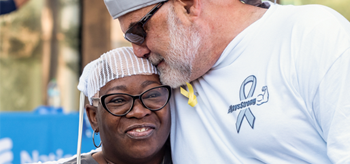Oligodendroglioma Research Fund awards its first grants to fight rare brain tumor
Today, the National Brain Tumor Society and Oligo Nation announced that Dr. David Louis, MD, of Massachusetts General Hospital and Harvard Medical School, and Dr. Anders Persson, PhD, of The University of California, San Francisco are the first grant recipients of the Oligodendroglioma Research Fund. The two grants, each for two years and $300,000 ($150,000/year), also mark the successful launch of the first initiative under the National Brain Tumor Society’s newest funding model, the Community Research Fund program.
The Community Research Fund is the only vehicle of charitable giving in the country that allows contributors to earmark donations for study of a particular brain tumor type, while ensuring the study meets strict scientific standards through the expertise of the National Brain Tumor Society’s distinguished Scientific Advisory Council.
The Oligodendroglioma Research Fund was launched in June of 2011 through the leadership of the family of Spencer and Zach Greene. The brothers – Spencer, 21, and Zach, 24 – were both diagnosed with an oligodendroglioma (oligo) brain tumor within two years of each other in 2008 and 2010, respectively. It then became the family’s mission to unite patients, families, friends, and people affected by oligo nationwide with a common goal to fight for a cure. The Greene’s contacted the National Brain Tumor Society and together established the Organization’s first Community Research Fund, with a goal of raising $300,000 (the minimum amount needed for a grant to conduct significant research) specifically for oligo research projects.
“After Spencer and Zach were diagnosed, we quickly realized that there was essentially no active medical research directed at oligos,” said Brock Greene, Spencer and Zach’s father and the founder of Oligo Nation, the effort’s fundraising and awareness campaign. “We knew that for progress to be made against this devastating disease, there needed to be much more research done that could identify the genetic underpinnings of these tumors and figure out how to attack them. And it was obvious that we had to find the right partner to help us reach our goal of more effective treatments.”
Through the passion and commitment of the Greene’s and other families touched by oligo, the Fund has raised close to $1,000,000 to date.
“An individual person, or even extended family, typically doesn’t have the financial resources or expertise to fund an entire research project of significant importance to them,” said N. Paul TonThat, Executive Director, National Brain Tumor Society. “Our Community Research Fund model allows dedicated donors with a common cause from across the country to unite and collectively to make a meaningful impact against a specific tumor that has impacted them in some way. This is especially important for a tumor like oligodendroglioma because its relativity rarity means it’s not often the focus of institute- or government-funded research.”
In 2012, National Brain Tumor Society convened a panel of leading oligo researchers to form an expert Advisory Council to guide the grant process, and help ensure scientific success. Chaired by visionaries, Dr. Gregory Cairncross, Professor and Head of the Department of Clinical Neurosciences at the University of Calgary, and G. Yancey Gillespie, PhD at University of Alabama at Birmingham, the group identified three specific areas of research that would hold the most promise to improve patient care: genomics, stem cell and lineage biology, and tumor modeling. A Request for Applications (RFA) was issued at the end of 2012 and experienced an overwhelming response from the scientific community. The Oligo Advisory Council then performed a rigorous review process to select the applications that were determined to best meet the needs of the current oligo research landscape.
Dr. Louis, Pathologist-in-Chief at MGH and Professor of Pathology at HMS, and Dr. Persson, of UCSF’s Department of Neurology and Neurological Surgery, are both internationally recognized leaders, and have years of experience, in the field of study of malignant brain tumors. Both researchers will lead projects that seek to determine what causes Oligo tumors to develop and subsequently grow through next-generation sequencing (Louis), and tumor modeling (Persson), so that future investigations can better understand what biomarkers to target with potential therapies.


